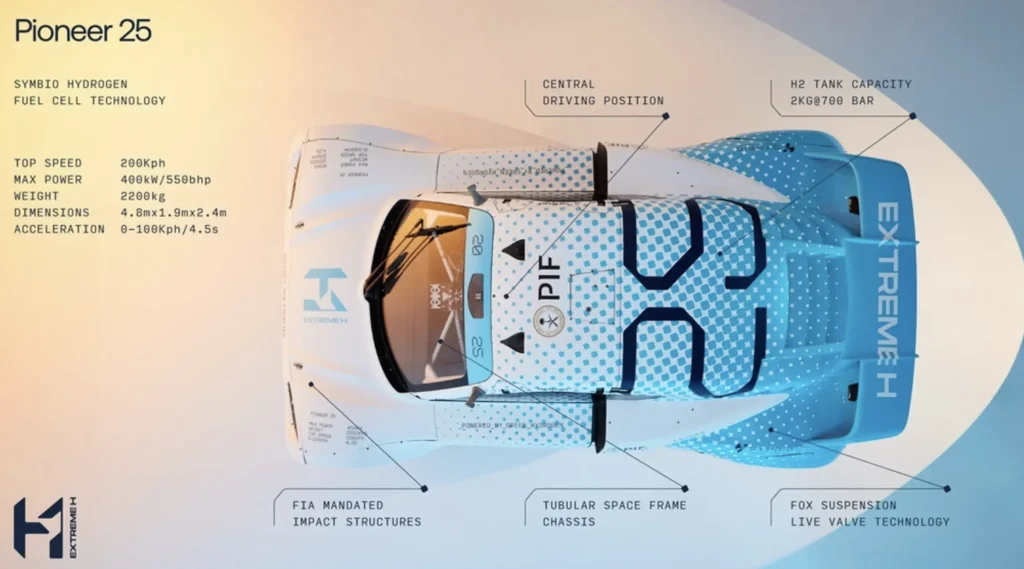
The automotive world is on the brink of a revolution, and hydrogen race cars are at the forefront of this transformation. As the motorsport industry increasingly looks for sustainable alternatives to traditional fuel, hydrogen cars are fast becoming the game-changing solution. This article explores how hydrogen race cars work, their benefits, and the role they could play in the future of motorsport.
How Do Hydrogen Race Cars Work?
Hydrogen race cars utilise hydrogen fuel cells to generate power. The basic principle behind these vehicles is the conversion of hydrogen gas into electricity through a chemical reaction between hydrogen and oxygen. This electricity powers the electric motor, which drives the car.
Unlike conventional internal combustion engines or even electric race cars powered by lithium-ion batteries, hydrogen cars have a distinct advantage in terms of refuelling time and range. A hydrogen fuel cell vehicle can be refuelled in minutes, much like a petrol car, making them highly practical for high-speed, high-demand environments like motorsport.
Related: New Small Hydrogen Engine Without Any Fuel Cells
The Benefits of Hydrogen Cars in Motorsport
Sustainability and Zero Emissions
One of the most significant advantages of hydrogen race cars is their sustainability. Hydrogen cars produce zero harmful emissions at the point of use, with water being the only byproduct of the chemical reaction in the fuel cell. This offers a clear environmental benefit, especially when compared to traditional fuel-powered race cars, which emit high levels of carbon dioxide and other pollutants.
Performance Potential
In terms of performance, hydrogen race cars are highly promising. Hydrogen has a higher energy density compared to traditional batteries used in electric vehicles, meaning hydrogen cars can deliver more power and longer range while maintaining lightweight designs crucial for racing. This makes hydrogen an ideal fuel for motorsport, where speed, endurance, and efficiency are critical.
Fast Refuelling Times
Another key advantage of hydrogen cars is their quick refuelling times. While battery-electric cars can take hours to recharge, hydrogen race cars can be refuelled in just a few minutes. This rapid refuelling capability could significantly enhance the competitiveness of hydrogen cars in the racing world, minimising downtime and allowing teams to stay on track.
Challenges and Opportunities for Hydrogen Race Cars
While the potential for hydrogen cars in the future of motorsport is exciting, there are still challenges to overcome. One of the primary issues is infrastructure. Currently, hydrogen refuelling stations are limited, particularly outside of urban areas, making widespread adoption more difficult.
There are also challenges related to hydrogen storage and transportation, as hydrogen is highly flammable and requires specialised tanks and handling procedures. However, advances in engineering and technology are making these challenges more manageable, and companies are actively developing solutions to improve the safety and practicality of hydrogen race cars.
For the motorsport industry, the adoption of hydrogen technology offers not only a path towards sustainability but also the chance to push the boundaries of what’s possible in high-performance racing.
First Hydrogen Race Car to Pass FIA Crash Test
A significant milestone in the development of hydrogen race cars came with the introduction of the first hydrogen-powered race car to pass the rigorous FIA crash test, a critical requirement for safety in motorsport. This car, designed by GreenGT for the Le Mans H24 hydrogen project, demonstrated that hydrogen-powered vehicles can meet the highest safety standards demanded by the world of competitive racing. Designed exclusively for Extreme H, the world’s inaugural hydrogen-powered motorsport, this car boasts a top speed of 200 km/h (124 mph).
The Pioneer 25 passing the FIA crash test is a major achievement, showing that hydrogen race cars are not only viable in terms of performance but also meet the stringent safety regulations that govern motorsport. This milestone represents a huge step forward in integrating hydrogen technology into mainstream racing and opens the door for more teams to explore hydrogen as a viable, sustainable alternative to traditional fuels.

The Role of Hydrogen Cars in the Future of Motorsport
As motorsport continues to evolve, hydrogen race cars are likely to play an increasingly important role in shaping its future. The future of motorsport is shifting towards greener, more sustainable alternatives, and hydrogen cars are perfectly positioned to meet this demand.
With major automotive companies investing in hydrogen technology, we’re likely to see more hydrogen-powered vehicles on the track in the coming years. From Formula 1 to endurance racing, the benefits of hydrogen could redefine what’s possible in terms of performance, sustainability, and innovation.
While battery-electric cars have gained significant traction in recent years, hydrogen-powered vehicles offer a complementary solution that addresses some of the limitations of electric vehicles, such as long charging times and limited range.
PRV Engineering and the Hydrogen Revolution
Hydrogen race cars represent an exciting shift in the future of motorsport. With their sustainability, high performance, and quick refuelling times, they offer a compelling alternative to traditional race cars and battery-electric vehicles. As technology continues to advance and infrastructure expands, hydrogen cars could become a defining feature of motorsport in the years to come.
Although PRV Engineering is not directly involved in motorsport, the company’s expertise in precision engineering makes it a valuable partner in the development of components for hydrogen cars. Hydrogen-powered vehicles require advanced engineering solutions, particularly for fuel storage, tanks, and specialised drivetrain components.
Our capacity to deliver high-quality, custom solutions for complex engineering projects positions us well to contribute to the growing hydrogen sector. Whether in motorsport or the wider automotive industry, PRV Engineering is ready to support the transition to greener, more sustainable technologies.


 Mail:
Mail: 



